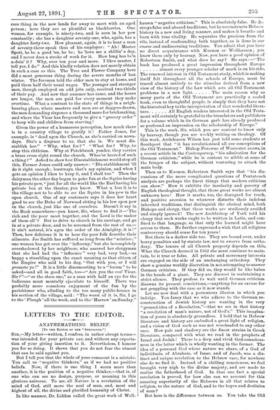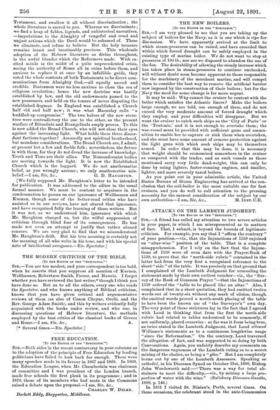LETTERS TO THE EDITOR.
ANATHEMATISING BELIEF.
[TO THE EDITOR OF sax " SPILCTATOR."]
Six.,—My letter—written, I confess, in rather abrupt terms— was intended for your private ear, and without any expecta- tion of your giving insertion to it. Nevertheless, I honour you for so doing. It shows that you do not fear the utmost that can be said against you.
But I tell you that the whole of your comment is a mistake. You call us "negative thinkers," as if we had no positive beliefs. Now, if there is one thing I scorn more than another, it is the position of a negative thinker,—that is, of one who can see no design, purpose, or meaning in this glorious universe. To me, all Nature is a revelation of the mind of God, still more the soul of man, and, most and highest of all, the divine and glorified humanity of Christ.
In like manner, Dr. Liddon called the great work of Well-
hansen " negative criticism." This is absolutely false. He de- stroys false and absurd traditions, but he reconstructs Hebrew history in a new and living manner, and makes it breathe and burn with true vitality. He separates the precious from the vile, instead of confounding both together, as is done in our coarse and undiscerning traditions. You admit that you have no direct acquaintance with Kuenen or Wellhausen ; you know them only by hearsay. Now, you have a good opinion of Robertson Smith, and what does ho say? He says :—" The book has produced a great impression throughout Europe almost every younger scholar of mark is on his side. The renewed interest in Old Testament study, which is making itself felt throughout all the schools of Europe, must be traced almost entirely to the stimulus derived from a new view of the history of the Law which sets all Old Testament problems in a new light The main reason why so many parts of the Old Testament are practically a sealed book, even to thoughtful people, is simply that they have not the historical key to the interpretation of that wonderful litera-
ture All English readers interested in the Old Testa- ment will certainly be grateful to the translators and publishers for a volume which in its German garb has already produced so profound an impression on the scholarship of Europe."
This is the work, Sir, which you are content to know only by hearsay, though you are weekly writing on theology. Of this work, Archdeacon Wilson has just told some students at Southport that " it has revolutionised all our conceptions of the Old Testament." Bishop Perowne of Worcester avows, in a recent article in the Contemporary, " his admiration for the German criticism," while he is content to nibble at some of the fringes of the subject, without venturing to attack the main body.
Then as to Kuenen, Robertson Smith says that " his dis- cussions of the more complicated questions of Pentateuch analysis are perhaps the finest things that modern criticism
can show." How it exhibits the insularity and poverty of English theological thought, that these great works are almost unknown here! How it marks, too, the disregard for truth, and positive aversion to whatever disturbs their indolent inherited traditions, that distinguish the clerical mind, both Bishops and clergy, that these works are studiously avoided and simply ignored ! The new Archbishop of York told his clergy that such works ought to be written in Latin, and con- fined to that language, so that only the learned might have access to them. He further expressed a wish that all religious controversy should cease for ten years !
But there is a darker side too. They are bound over, under heavy penalties and by statute law, not to swerve from ortho- doxy. The tenure of all Church property depends on this. What the Church decreed in 1562 she must continue to main- tain, be it true or false. All private and mercenary interests are engaged on the side of an unchanging orthodoxy. They show a genuine worldly discretion in not attempting to answer German criticism. If they did so, they would be like babes in the hands of a giant. They are discreet in maintaining a strict silence. They profess to wait until German criticism disowns its present convictions,—anything for an excuse for not grappling with the case as it now stands.
Let me now deal with a portentous illusion in which you indulge. You fancy that we who adhere to the German re- construction of Jewish history are wanting in the very "ground-idea of a Revelation,"—that we see in that history "a revelation of man's nature, not of God's." This imagina- tion of yours is absolutely groundless. I hold that in Hebrew literature and history are embodied a great light of religion, and a vision of God such as was not vouchsafed to any other race. How pale and shadowy are the finest strains in Greek literature, compared with what we read in the prophets of Israel and Judah ! There is a deep and vivid God-conscious. nese in the latter which is wholly wanting in the former. The idea of a personal God whose nature we share, of a God of individuals, of Abraham, of Isaac, and of Jacob, was a dis- tinct and unique revelation to the Hebrew race, for nowhere else do we find it. Instead of a chilling remoteness, we feel brought very nigh to the divine majesty, and are made to realise the fatherhood of God. In that one fact a special revelation is proved, for how else can we account for this amazing superiority of the Hebrews in all that relates to religion, to the nature of God, and to the hopes and destinies of man ?
But here is the difference between us. You take the Old Testament, and swallow it all without discrimination ; the whole literature is sacred to you. Whereas we discriminate ; we find a heap of fables, legends, and unhistorical narratives, —imputations to the Almighty of vengeful and cruel and unjust actions which the Devil would be ashamed of. These we eliminate, and refuse to believe. But the holy treasure remains intact and inestimably precious. This wholesale adoption of the Hebrew literature as divine throughout, is the awful blunder which the Reformers made. With ex- cited minds in the midst of a quite unprecedented crisis, seeing the authority of Rome all in ruins before them, and anxious to replace it at once by an infallible guide, they voted the whole contents of both Testaments to be direct com- munications from Almighty God,—all equally sacred and credible. Statesmen were no less anxious to close the era of religious revolution; hence the new doctrine was hastily established by law, and the old endowments passed to the new possessors, and held on the tenure of never disputing the established dogmas. In England was established a Church half old and half new ; it was what Macaulay calls " a huddled-up compromise." The two halves of the new struc- ture were contradictory the one to the other, as the present warfare of Ritualists and Evangelicals amply proves. To this is now added the Broad Church, who will not close their eyes against the increasing light. What holds these three discor- dant factions together? Assuredly not spiritual brotherhood, but mundane considerations. The Broad Church are, I admit, at present but a few and feeble folk ; nevertheless, the future is with them, for they do not dread the increase of knowledge. Truth and Time are their allies. The Nonconformist bodies are moving towards the light. It is now the Established Church which is the laggard. We do not anathematise belief, as you wrongly assume ; we only anathematise mis-
[We fully supposed Mr. Haughton's letter to be intended for publication. It was addressed to the editor in the usual formal manner. We must be content to acquiesce in the condemnation he passes on our ignorance of Wellhausen and Kuenen, though some of the better-read critics who have assisted us in our reviews, have not shared that ignorance, and have recognised fully the learning of those writers. But it was not, as we understood him, ignorance with which Mr. Haughton charged us, but the wilful suppression of criticism through blind fear of its consequences. He has made not even an attempt to justify that rather absurd censure. We are very glad to find that we misunderstood Mr. Haughton's drift. But his true meaning is certainly not the meaning of all who write in his tone, and with his special note of intellectual arrogance.—En. Spectator.]



































 Previous page
Previous page